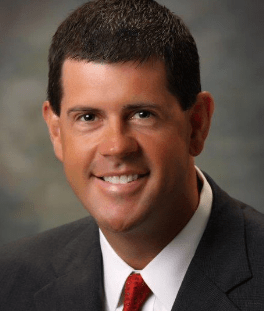Personal tributes have been pouring in since Rep. Chris Harris, D-Forest Hills, announced on December 19 that he will not seek re-election as state representative for Pike and Martin counties.

Open government proponents are deeply saddened by Rep. Harris’s announcement.
His advocacy for the laws securing the public’s right to know has been unwavering.
As a member of the Pike County Fiscal Court from 2000 to 2014, and later as a state representative, Rep. Harris was on the front lines of the battle to expose Utility Management Group (UMG), a publicly funded “private entity,” to the light of public scrutiny.
A little explanation is needed here.
In 2012, the Kentucky General Assembly amended KRS 61.870(1)(h).
That statute was originally enacted in 1976 to expand the scope of the open records law to records in the possession of otherwise nonpublic “bodies” that receive 25% or more of the funds they expend in the Commonwealth from state or local authority funds *and* that relates to publicly funded functions, activities, programs or operations.
This enabled the public to follow the public money trail to private entities that received a quarter or more of their funding from a public source.
While other parts of the open records law underwent amendment, “for over thirty-five years, this part of the ORA remained virtually unchanged” the Kentucky Court of Appeals observed in a 2015 open records case involving UMG status under the open records law.
The 2012 amendment excluded, from the 25% public funding threshold, public funds these “bodies” receive in compensation for goods or services they provide under a public competitively bid contract.
This vastly reduced the statute’s scope and application.
The amendment’s backstory is exceedingly murky. What is not murky is that UMG reaped great benefits from the 2012 amendment. Since the amendment’s enactment, UMG’s records have been inaccessible, and it has successfully evaded public scrutiny.
UMG is a privately owned, for-profit company that provides management and operational services for public waterworks, and other services, under public competitively bid contracts with the Mountain Water District and the City of Pikeville. The attorney general and the courts have recognized that it derives virtually all of its revenue from payments received under these contracts.
In 2011, UMG denied an open records request for checks and expenses that was submitted to it by the Pike County Fiscal Court on which Chris Harris served. UMG denied the request for a basic accounting of its expenditure of public funds, arguing that it was “a wholly private entity,” and not a public agency subject to the open records law, in spite of the fact that it was nearly 100% publicly funded.
Pike County successfully appealed UMG’s denial of its open records request to the attorney general in 2011. The attorney general confirmed that UMG had “only two known sources of revenue — the contract with [Mountain Water District and the city” and that it was, therefore, subject to the open records law under the law’s pre-amendment definition of the term “public agency.”
As noted above, one year later that changed. KRS 61.870(1)(h) underwent amendment for the first time in 35 years.
As a Capitol basement-dweller for 17 of my 25 years in the Office of the Attorney General, I observed some shady political machinations from a safe distance.
But the maneuvering that attended enactment of the 2012 amendment to the open records law, neatly designed to exclude UMG from the law by eliminating “bodies” receiving public funds in compensation for goods or services provided under a public competitively bid contract, was nothing short of jaw-dropping.
Rep. Harris, who I eventually came to know and deeply respect, was a key player in the successful legal efforts to defend the public’s right of access to UMG’s financial records, ultimately prevailing in the Kentucky Supreme Court on the issue of the Pike County Fiscal Court’s right to the records identified in its 2011 open records request to UMG.
He came to the legislature in 2015 and made two valiant, albeit unsuccessful, attempts to limit the adverse impact of the 2012 amendment to the open records law, once in 2016 and once in 2017. He sponsored bills to restore to the 25% or more public funding threshold funds received by otherwise nonpublic “bodies,” like UMG, in compensation for competitively bid services performed for public agencies “relating to public utilities, water and wastewater services, fire protection, correction and incarceration, law enforcement, tax assessment and collection, or waste management.”
The political climate was not favorable to re-introduction of his bills in succeeding years.
Rep. Harris understood, far more than most, that “where public funds go, the public interest follows.”
As one of Rep. Harris’s many friends and admirers, Adam Edelen, wrote: “Fighting corruption has been Kentucky’s defining battle since our founding. No one has lived at the tip of that spear more willingly than Chris Harris. He has the scars to prove it.”
Like Adam Edelen, we believe he will return to public life when the time is right and we will be better when he does.
(Amye Bensenhaver spent 25 years as an assistant attorney general in Frankfort and is an expert on open records and open meetings. Now out of state government, she writes about these issues. Bensenhaver is a co-founder of the Kentucky Open Government Coalition with Jennifer P. Brown, who is the editor of Hoptown Chronicle.)
Amye Bensenhaver spent 25 years as an assistant attorney general in Frankfort and is an expert on open records and open meetings. Now out of state government, she writes about these issues. Bensenhaver is a co-founder of the Kentucky Open Government Coalition with Jennifer P. Brown, who is the editor of Hoptown Chronicle.






